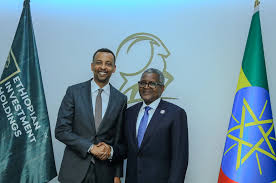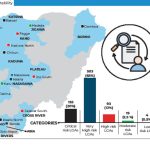In Gode, Ethiopia, Aliko Dangote, President and Chief Executive of the Dangote Group, presided over the launching of a $2.5 billion fertilizer facility.
With an annual production capacity of three million metric tons of urea, the project—a collaboration between the Dangote Group and Ethiopian Investment Holdings (EIH)—is anticipated to grow into one of the biggest fertilizer complexes in the world.
It will use Ethiopia’s plentiful natural gas resources from the Hilal and Calub reservoirs, which are strategically positioned in the country’s southeast, to increase agricultural output, generate employment, and improve food security around the Horn of Africa. Recall that in August, the Dangote Group and Ethiopian Investment Holdings (EIH), the government of Ethiopia’s strategic investment arm, signed a comprehensive shareholders’ agreement to design, build, and run a world-class urea fertilizer production complex in Gode, Ethiopia.
Under the terms of the collaboration, Dangote Group would retain 60% ownership of the project, which is one of the biggest industrial investments in Ethiopian history, while EIH will own 40% of the company.
Speaking at the event, Prime Minister Abiy Ahmed emphasized that the fertilizer project represents peace, collaboration, and shared responsibility and went beyond simple industrial advancement.
According to PM Abiy, the project demonstrates Ethiopia’s dedication to seizing chances and enhancing its standing internationally.
They represent our collective obligation to seize opportunities, fortify collaboration, and advance peace. Therefore, I urge all Ethiopians to keep organizing together for advancement,” Abiy stated.
Dangote praised Ethiopian Prime Minister Abiy Ahmed Ali and his government for economic liberalization and changes that have made Ethiopia one of Africa’s most alluring investment destinations for foreigners and opened up important industries to private capital. He praised the government’s investments in energy, transportation, and the Grand Ethiopian Renaissance Dam, describing them as the cornerstones of the nation’s industrialization.
“This collaboration with Ethiopian Investment Holdings marks a significant turning point in our common goal of industrializing Africa and ensuring food security throughout the continent,” Dangote stated.
Dangote went on to say that the Gode project is only the beginning and that Ethiopia would become a regional center for fertilizer production by expanding into the manufacturing of other fertilizers such calcium ammonium nitrate, ammonium nitrate, ammonium sulphate, and NPK. He projected that Ethiopia might emerge as Africa’s most productive country in five years.
The Dangote Group’s second significant project in Ethiopia is this venture. For almost ten years, its cement company has run a 2.5Mta factory in Mugher, and it has committed an additional $400 million to double its capacity.
According to Dangote, the Group’s strategy is based on the idea that “only Africans can develop Africa,” with an emphasis on manufacturing to lessen reliance on imports throughout the continent. He emphasized how the Group’s refinery, cement facilities, and fertilizer expansion—which is expected to reach the greatest in the world at nine million metric tonnes annually—have helped turn Nigeria into a net exporter of petroleum products, cement, and fertilizer.
Nigeria’s story has already changed as a result of these investments, Dangote said. “Instead of relying on imports, we are now self-sufficient and even export gasoline, fertilizer, and cement. Our goal is to assist other African countries in undergoing the same change. Our goal is for African nations to become self-sufficient in producing items whose raw resources are easily accessible. Through our investments, we have proven that accomplishment in the cement industry, enabling numerous African nations to become net exporters of cement. We look forward to working with more African nations to advance their objectives and goals for industrialization.





